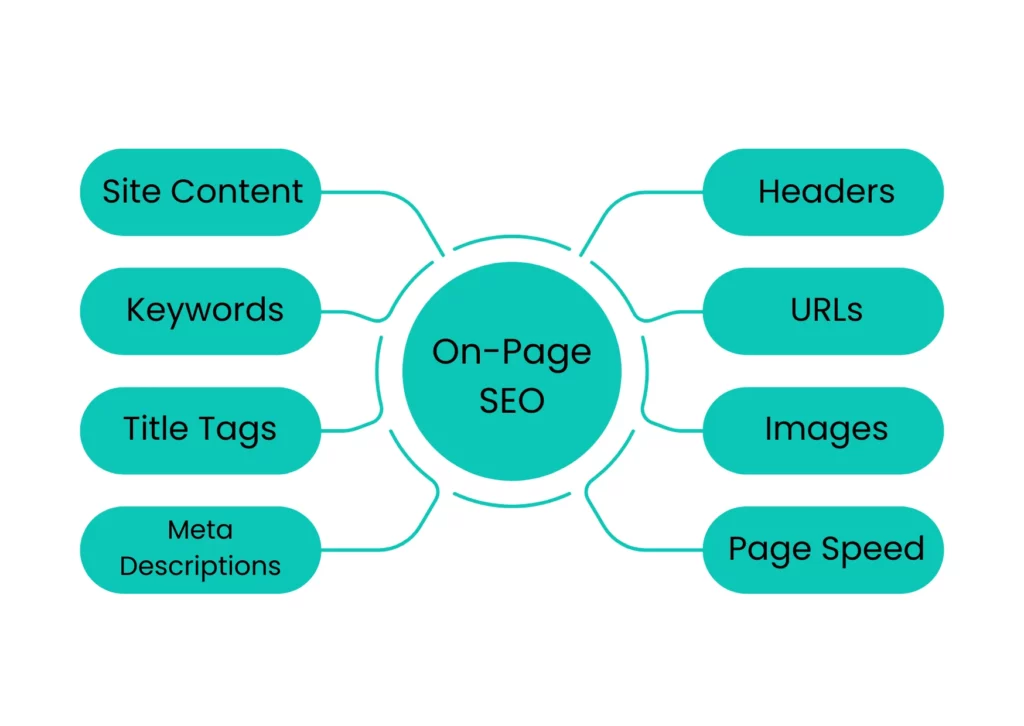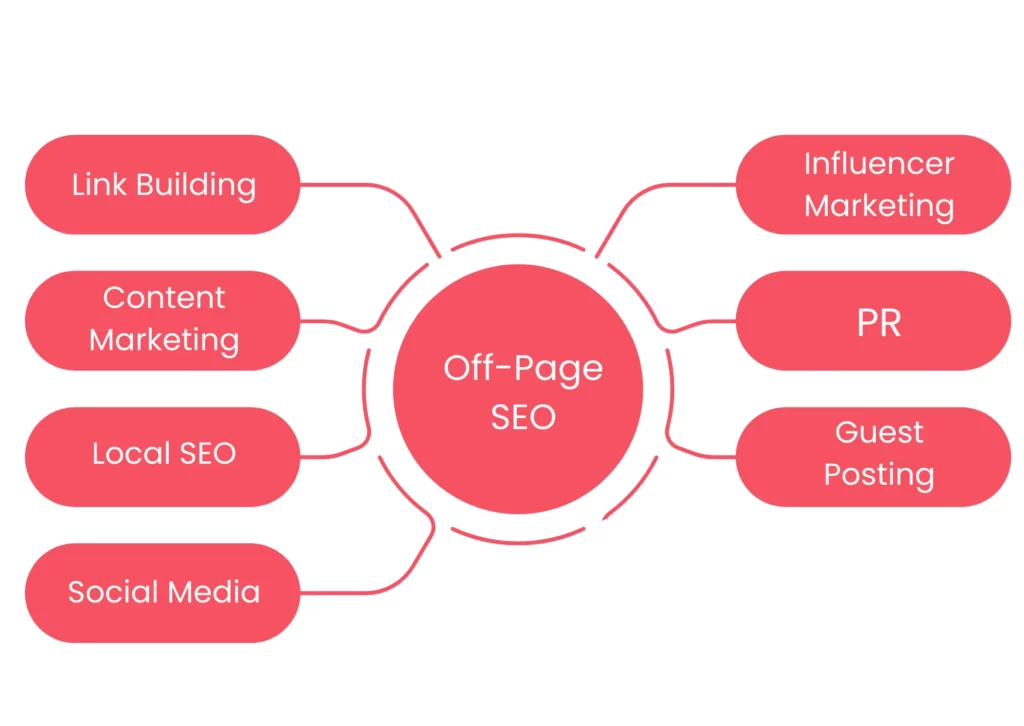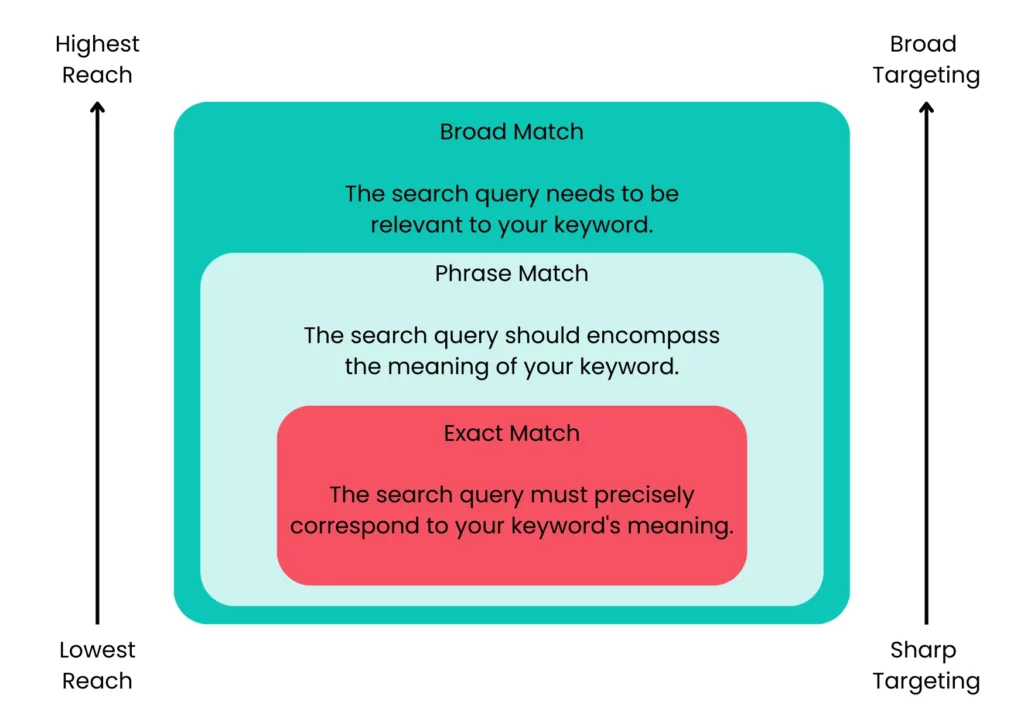
In digital marketing, SEO and PPC are a dynamic duo. SEO acts like a gardener, nurturing your site to naturally climb search results, while PPC gives you instant top spots with paid ads. Both rely on smart keyword use to attract your audience.
SEO builds lasting visibility with quality content and the right keywords. PPC offers a quick boost through paid ads. Together, they create a powerful strategy for small businesses, reaching customers at every stage—from discovery to purchase.
By combining SEO and PPC, you can draw in more visitors and increase sales. This guide explores how this dynamic duo can elevate your marketing efforts and drive business success.
Table of contents
The Role of Keywords in SEO
Keywords play a big role in SEO, influencing how search engines like Google see and rank your content. When people search for things online, search engines look for relevant results based on the words used. Using the right keywords can help boost your website’s ranking in search results.
Effective SEO strategies are usually split into two types; on-page SEO and off-page SEO.
- On-page SEO means improving parts of your website that you can control.
- Off-page SEO means promoting your site or brand on other websites.
In simple terms, on-page SEO is about making your website good for visitors and search engines. Off-page SEO is about getting your site noticed and trusted by others online.
On-Page SEO

In on-page SEO, placing keywords strategically in titles, descriptions, headers, and throughout your content is crucial. It signals to search engines that your page is relevant to specific search queries, which can improve your rankings. Additionally, well-placed keywords help users quickly grasp what your content is about, making it easier to read and understand. This balance of keyword usage ensures that both search engines and visitors find your content valuable and accessible.
Factors that can impact on-page SEO include a variety of elements that contribute to how well your website performs in search engine rankings. Here are some of the key elements:
1) Site Content
The quality and relevance of your content are significant. Create informative, engaging, and original content that addresses the needs and queries of your target audience. Use keywords naturally throughout the content to ensure it aligns with what users are searching for.
2) Keywords
Conducting thorough keyword research is essential to identify the terms your target audience frequently uses. Integrate these keywords naturally into your content to improve its relevance and avoid keyword stuffing, which can harm your SEO. Use a balanced mix of primary keywords, long-tail keywords to address different search intents and improve your chances of ranking higher in search results.
3) Title Tags
The title tag is one of the most important on-page SEO elements. It should include your primary keyword and be compelling enough to attract clicks. Keep it concise, ideally under 60 characters, to ensure it displays fully in search results.
4) Meta Descriptions
Meta descriptions should provide a brief, engaging summary of the page content, including relevant keywords. While meta descriptions don’t directly affect rankings, they influence click through rates, which can indirectly impact SEO.
5) Headers (H1, H2, H3, etc.)
Use header tags to structure your content and make it easier to read. The H1 tag should include your main keyword and clearly state the page’s topic. Use H2 and H3 tags for subheadings, incorporating secondary keywords where appropriate.
6) URLs
Create clean, descriptive URLs that include your primary keyword. Avoid long, complex URLs with unnecessary characters. A simple URL helps search engines understand the page content and improves user experience.
7) Images
Optimize images by using descriptive file names and including keywords in the alt text. This helps search engines understand the content of the images and improves your visibility in image search results. Additionally, compress images to ensure they load quickly without sacrificing quality.
8) Page Speed
A fast-loading website is important for both user experience and SEO. Optimize your site’s performance by compressing images, leveraging browser caching, and minimizing the use of heavy scripts.
Off-Page SEO

Off-page SEO involves getting links from other websites, which also benefits from using keywords in the links. These links act as recommendations to search engines, showing that your website is valuable and trustworthy.
You can enhance your website’s authority, visibility, and credibility, leading to improved search engine rankings and increased organic traffic with off-page SEO strategies.
Here are some key factors that can impact off-page SEO:
1) Link Building
This involves acquiring backlinks from other websites to your own. Backlinks act as “votes of confidence” for your site’s authority and relevance. However, quality matters more than quantity, so it’s essential to focus on obtaining links from reputable and relevant websites.
2) Content Marketing
Creating high-quality and engaging content that naturally attracts backlinks and social shares is a key component of off-page SEO. When you produce valuable content, other websites are more likely to link to it, boosting your site’s visibility and authority.
3) Local SEO
For businesses targeting local customers, optimizing for local search is crucial. This involves ensuring your business is listed accurately in local directories, obtaining positive reviews, and optimizing your website for local keywords.
4) Social Media
While social media signals themselves may not directly impact search engine rankings, having an active presence on social media can help increase brand awareness, drive traffic to your website, and foster engagement, all of which indirectly benefit your off-page SEO efforts.
5) Influencer Marketing
Collaborating with influencers or industry experts can help amplify your brand’s reach and credibility. When influencers promote your brand or content to their audience, it can lead to increased visibility, traffic, and potential backlinks.
7) Guest Posting
Publishing high-quality guest posts on reputable websites within your industry is an effective way to build backlinks, increase brand exposure, and establish authority. Guest posting allows you to reach new audiences and attract traffic back to your website.
The Role of Keywords in PPC
In the world of PPC (Pay-Per-Click) advertising, keywords are the most important part of successful paid search campaigns. Choosing the right keywords is significant because it determines whether your ads will be seen by potential customers who are looking for products or services like yours. Keywords in PPC advertising act as triggers that control when your ads show up in search results, helping you reach the right audience.
Types of Keyword Matches

PPC keywords are divided into different match types, which tell how closely a keyword needs to match a user’s search words for your ad to appear. Understanding and using these match types is important for targeting your ads properly. Keywords are split into three types; broad match, phrase match and exact match.
1) Broad Match
This match type lets your ad show up for searches that include misspellings, synonyms, related searches, and other relevant variations. While broad match gives you the widest reach, it can also lead to less targeted traffic.
Example: If your keyword is “running shoes,” your ad might appear for searches like “jogging sneakers”, “buy running footwear”, or “running shoe sales”. This type of match captures a wide audience but might not always be highly relevant.
2) Phrase Match
Ads are shown for searches that include the exact phrase or close variations of the phrase, with extra words before or after. This match type balances reach and precision.
Example: If your keyword is “running shoes”, your ad might appear for searches like “best running shoes for men”, “cheap running shoes online”, or “reviews of running shoes”. The search query must contain the phrase “running shoes” in that order, but additional words can be included.
3) Exact Match
Ads are displayed only for searches that exactly match the keyword or close variations. This match type offers the highest level of precision, making sure your ads are shown to users searching for the exact term you chose.
Example: If your keyword is “running shoes”, your ad might appear for searches like “running shoes” or “buy running shoes”. It will not appear for searches like “best running shoes” or “shoes for running” ensuring that the audience is highly targeted.
Bidding Strategies and Optimization
Besides choosing the right keywords and match types, effective bidding strategies are important to make the best use of your ad spend and improve your returns. Bidding strategies can be automated or manual and determine how much you are willing to pay for each click. By matching your bids with the performance and competition of your keywords, you can make your PPC campaigns more efficient.
Keyword Research: Finding the Right Keywords
Effective keyword research is essential for the success of your strategy. Here’s a detailed guide on how to find the right keywords with the help of various tools, and how to analyze competition and search intent.
Steps for Keyword Research
- Brainstorming Initial Keywords: Start by thinking of words and phrases related to your business, products, or services. Consider what potential customers might search for to find what you offer. Make a list of these initial keywords.
- Expanding the List with Tools: Use keyword research tools to expand your list. These tools can suggest additional keywords you may not have thought of.
- Evaluating Keyword Metrics: Look at metrics such as search volume (how often the keyword is searched), keyword difficulty (how hard it is to rank for the keyword), and cost-per-click (how much advertisers are paying for the keyword in pay-per-click advertising).
- Grouping Keywords: Organize your keywords into groups based on themes or topics. This helps in creating targeted content and organizing your SEO efforts.
- Optimizing the List: Narrow down your list to focus on keywords that have a good balance of search volume and competition. Aim for keywords that are highly relevant to your business and have the potential to attract quality traffic.
Using Tools for Keyword Research
1) Google Keyword Planner
- Google Keyword Planner allows you to enter words or phrases related to your business to get keyword suggestions.
- See how many searches a keyword gets and get estimates on how it might perform.
- Understand the level of competition and bid estimates for each keyword.
2) Adsby Free Keyword Generator
- Adsby Free Keyword Generator enhances website search engine ranking with relevant, high-traffic keywords.
- Small business owners and startups benefit greatly from tailored keywords to meet specific SEO needs. Adsby‘s AI swiftly generates SEO compatible keywords in seconds.
- Boost online visibility significantly by strategically integrating generated keywords into website content or ads.
3) SEMrush
- Semrush gets a detailed analysis of any keyword, including search volume, keyword difficulty, and trends.
- Generate a large list of keywords based on a single seed keyword and organize them by topic.
- Analyze the keywords your competitors are ranking for and identify opportunities to outrank them.
4) Ahrefs
- Ahrefs discovers keyword ideas, analyze their ranking difficulty, and see their potential traffic.
- Identify keywords your competitors are ranking for, but you are not.
- Get detailed insights into the search engine results pages for your target keywords, including who is ranking and why.
How to Conduct Competitor Keyword Research?
If you want to stand out online and beat your competitors, it’s important to study what they’re doing with keywords. This helps you figure out how to improve your own keyword use. Here are the main steps to do this:
- Identify your main competitors in your industry.
- Find out what keywords your competitors are using.
- Filter and categorize the keywords to analyze them effectively.
- Look at metrics to understand the importance of each keyword.
- Choose the best keywords for your goals, considering factors like relevance, search volume, and competition level.
Implementing Keywords in SEO and PPC Campaigns
Where online visibility can make or break a business, the strategic placement of keywords is significant in both Search Engine Optimization (SEO) and Pay-Per-Click (PPC) campaigns. Let’s explore how to effectively integrate keywords into each domain:
SEO Implementation
The key to mastering SEO lies in the artful use of keywords. Here’s a creative guide to help you implement keywords effectively and transform your digital presence.
1. Primary Keywords in Key Areas
To maximize the impact of your SEO efforts, place your primary keywords strategically in critical areas of your web pages. These areas are vital because they provide strong signals to search engines about the relevance and context of your content. Here’s where to focus:
- Page Titles: The title tag of your webpage is one of the most important places for keywords. Ensure that your primary keyword appears naturally in the title. This helps search engines understand what the page is about and can improve your ranking for that keyword.
- Meta Descriptions: While meta descriptions don’t directly influence rankings, they impact click through rates. Incorporate your primary keyword in a way that entices users to click on your link by summarizing the content accurately and compellingly.
- Headers (H1, H2, etc.): Headers structure your content and make it easier for both users and search engines to navigate. Use your primary keyword in the H1 tag, and consider using variations or related keywords in H2 and H3 tags to further emphasize the main topics.
- Throughout the Content: Integrate your primary keyword naturally within the body of your content. Aim for a seamless flow that makes sense to readers. This reinforces the topic of your page without feeling forced or repetitive.
2. Avoid Keyword Stuffing
While it’s good to use keywords, don’t use them too much. Keyword stuffing means putting too many keywords into your content just to trick search engines. This can cause problems in two main ways:
- Search Engine Problems: Search engines like Google can tell when you’re stuffing keywords. If they catch you, your site might get punished. This means your site could get ranked lower or even taken off the search results.
- Bad Experience for Users: Using too many keywords can make your content hard to read and annoying for users. If people can’t understand or enjoy your content, they might leave your site.
Instead, focus on using keywords naturally. Write content that’s interesting and easy to read for your audience. Keywords should fit in smoothly and make your content better, not worse.
3. Long-Tail Keywords for Specificity
In addition to primary keywords, incorporating long-tail keywords into your content can be highly beneficial. Long-tail keywords are longer, more specific phrases that often cater to niche audiences. They have distinct advantages:
- Lower Competition: Long-tail keywords typically face less competition than broad, high-volume keywords, making it easier to achieve higher rankings for these terms.
- Higher Conversion Rates: Because they are more specific, long-tail keywords often attract users who are further along in the buying cycle and ready to convert. For example, a user searching for “affordable vegan restaurants in downtown New York” is more likely to visit and make a purchase than someone searching for “restaurants.”
To effectively use long-tail keywords:
- Identify Specific Needs: Think about the specific needs and questions your audience may have. Use tools like Google’s Keyword Planner, SEMrush, Ahrefs, or Free Keyword Generator Tool Al-Powered by Adsby to find relevant long-tail keywords.
- Integrate Naturally: Incorporate these phrases naturally into your content. Long-tail keywords can often fit seamlessly into blog posts, FAQs, and detailed product descriptions.
By strategically placing primary keywords, avoiding keyword stuffing, and leveraging long-tail keywords, you can significantly enhance your website’s SEO performance. This balanced approach ensures that your content remains user-friendly and relevant, while also meeting the criteria that search engines use to rank pages.
PPC Implementation
PPC advertising allows you to bid on keywords and display ads to users who search for those terms. Here’s how to implement keywords effectively for PPC campaigns:
- Keywords in Ad Copy and Landing Pages: Integrate your target keywords into your ad copy and corresponding landing pages to ensure alignment and relevance. Compelling ad text infused with relevant keywords not only increases click-through rates but also improves ad quality scores, leading to better ad positions and lower costs per click.
- Ad Extensions for Enhanced Visibility: Utilize ad extensions, such as sitelinks, callouts, and structured snippets, to provide additional information and enhance your ad’s visibility. Ad extensions expand the ad’s real estate on the search results page and offer more opportunities to showcase relevant keywords and encourage user engagement.
Monitoring and Refinement
Continuous monitoring and refinement of keyword performance are essential for optimizing both SEO and PPC campaigns:
- Performance Metrics Analysis: Regularly analyze key performance metrics, such as click-through rates (CTR), conversion rates, and cost-per-conversion, to evaluate the effectiveness of your keywords. Identify high-performing keywords and allocate resources accordingly to maximize ROI.
- Bid Adjustments and Keyword Refinement: Based on performance data and campaign objectives, make bid adjustments and refine your keyword lists as needed. Experiment with different match types, ad creatives, and landing page variations to identify the most effective combinations. Iteratively optimize your campaigns to improve performance over time and stay ahead of competitors.
By implementing keywords strategically in both SEO and PPC campaigns and continuously monitoring and refining their performance, you can enhance your website’s visibility, attract relevant traffic, and drive meaningful conversions effectively in today’s competitive digital landscape.
Common Mistakes in Keyword Strategy
When it comes to making your keyword strategy work, it’s important to avoid some common mistakes. Let’s take a closer look at these errors to ensure you’re on the right path:
1. Using Too Many Keywords
One big mistake is using too many keywords in your content. Some people think this will help them rank higher on search engines. But it can actually get you into trouble with search engines and annoy your readers. Instead, focus on creating good content that naturally includes the right keywords. This way, you’ll keep your readers happy and improve your chances of ranking well.
2. Ignoring Long-Tail Keywords
Another mistake is ignoring long-tail keywords. Even though fewer people search for them, they can lead to more sales because they’re very specific. Long-tail keywords are less competitive, so they’re easier to rank for. Using a mix of long-tail keywords can help you attract the right customers to your site.
3. Not Updating Your Keyword Lists
Forgetting to update your list of keywords regularly is another problem. The internet changes all the time, so you need to keep up with what people are searching for. By reviewing and updating your list regularly, you’ll stay relevant and make sure your content matches what your audience is looking for.
By avoiding these common mistakes and using keywords effectively, you can improve your chances of success in the digital world.
Conclusion: The Future of Keywords in Digital Marketing
As technology continues to get better, how we use keywords in marketing is changing too. New things like voice search, artificial intelligence, and machine learning are shaping how people search online and find content. We need to look at these new trends and see how they’ll affect the future of using keywords in digital marketing.
Looking ahead, we can expect to see new tools like AI-powered keyword generators, voice search optimization tools, predictive analytics platforms, and more. These tools will help us do keyword research, use keywords better, and keep track of how our keywords are doing.
Even though things are changing, one thing is still clear. Keywords are still important in digital marketing. But we need to use them in new ways as technology changes and people’s habits change. To stay ahead, we need to be ready to try new things and use new tools.
By being open to new ideas and willing to change our strategies when needed, we can make sure our keyword strategies keep working well in the digital world of the future.